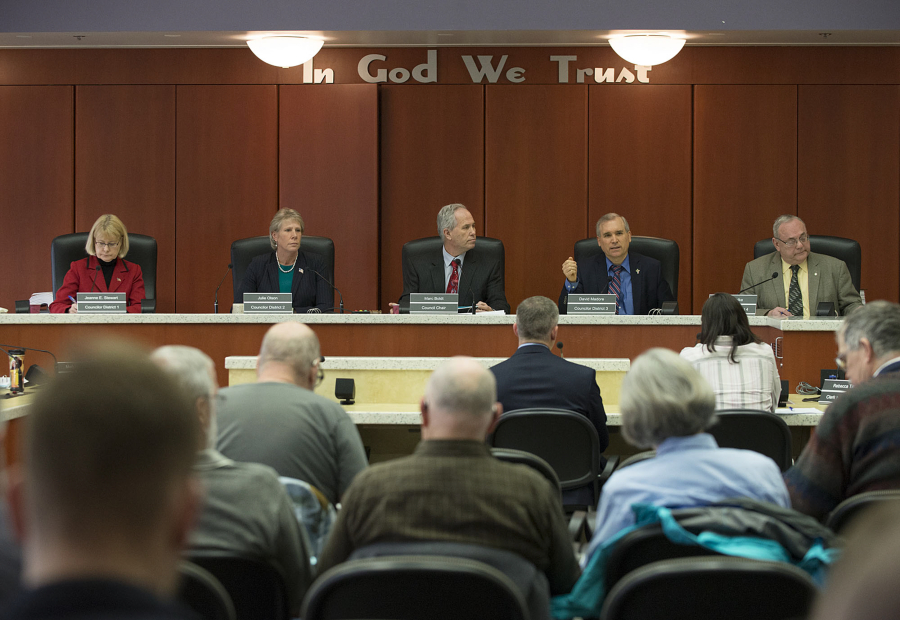Clark County’s ongoing drama is moving from the hearing room to the courtroom this week, as judges will begin to consider two legal issues facing the county council.
Judge Stephen Warning, a Cowlitz County judge, will consider on Friday morning whether a recall petition Republican Councilor Tom Mielke filed against Council Chair Marc Boldt, no party preference, and Republican Councilors Julie Olson and Jeanne Stewart has merit.
Also on Friday, Clark County Judge David Gregerson is scheduled to consider hearing dates in conservative political activist Christian Berrigan’s referendum petition to the county’s 20-year growth plan.
Mielke filed a recall petition against his fellow councilors late last month, leveling four accusations against them.
He alleged that the three violated the Open Public Meetings Act; illegally granted The Columbian a contract as the county’s official newspaper of record; prevented Mielke from accessing the county’s attorneys; and allowed County Manager Mark McCauley to dissolve the Department of Environmental Services even though it had been budgeted for this year.
Mielke through his attorney, Seattle-based Michael Kahrs, submitted a nearly 300-page memorandum outlining his allegations and providing evidence he believes will prove the alleged wrongdoing of his fellow councilors.
In a recall petition, a judge is tasked with determining whether the recall is valid, and whether there’s enough evidence to find that the targets committed misfeasance, malfeasance or a violation of the elected officials’ oath of office.
Misfeasance means performing a duty in an improper manner. Malfeasance is the commission of an unlawful act. Violating the oath of office means an elected official neglected or knowingly failed to perform their duties. Any of the three or a combination could prompt a judge to find the petition valid.
Boldt, Olson and Stewart have dismissed Mielke’s allegations.
Berrigan filed a referendum petition to the Comprehensive Growth Management Plan update adopted last month. But the Clark County council, citing significant legal evidence, voted two weeks ago to ask a judge to declare that the growth plan petition cannot be the subject of a referendum.
County attorneys allege that Berrigan “abused the judicial process and that this action is frivolous.” They asked that a judge hold him accountable for attorney fees.
Berrigan, reacting to the news, pulled his petition. He shared a letter over the weekend with Richard Colwell, a Republican running for a representative seat in the 17th Legislative District, declaring he was withdrawing his referendum petition. He submitted the three-page letter to Elections Supervisor Cathie Garber on Wednesday.
In the letter, Berrigan blames a “poorly written charter” and “tactics designed to bully and intimidate” as barriers to appealing the comprehensive plan.
“One may have the right to petition one’s government for a redress of grievances, but woe to those in Clark County who try to exercise that right!” Berrigan wrote. “The effect is chilling.”
But perhaps it won’t be so chilling after all. After criticism from several community members and Republican Councilor David Madore and Mielke, who both voted against seeking declaratory action, the other councilors backed away from the desire to pursue attorney fees in the case.
Deputy Prosecutor Chris Horne described the request for fees as a standard part of the county filing suit. The council could choose to abandon that, he said.
The other councilors agreed.
“I would, in this case, weigh in on the side of giving the citizens the benefit of the doubt,” Stewart said.
Whether a judge will hear Berrigan’s petition is in question. When asked if the new information — Berrigan’s letter and the council’s decision not to pursue legal fees — changed anything, Horne couldn’t say much to clear up the issue. It might, he said.
Regardless, there is already substantial evidence that Berrigan’s petition is invalid anyway. Horne and Jane Vetto cited at a recent board time meeting a 2006 state Supreme Court decision ruling that ordinances approved under the Growth Management Act are not subject to referenda. A guide on initiatives and referendums by the Municipal Research and Services Center further clarifies, saying simply that ordinances adopted under the Growth Management Act are not subject to the power of referendum.
Additionally, Clark County’s home rule charter states that ordinances required by state or federal law, such as the comprehensive plan, are not subject to referendum.




